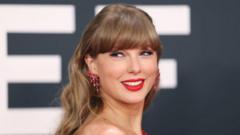**A recent BBC study uncovers a troubling trend in Steven Bartlett's Diary of a CEO podcast, where health misinformation proliferates under the guise of expert opinion, raising alarms for public health.**
**Podcast Controversy: Steven Bartlett's Diary of a CEO Under Fire for Health Misinformation**

**Podcast Controversy: Steven Bartlett's Diary of a CEO Under Fire for Health Misinformation**
**Investigation reveals harmful health assertions on popular podcast threaten public trust in evidence-based medicine.**
Recent findings by the BBC World Service have revealed that Steven Bartlett's popular podcast, "Diary of a CEO," is promoting harmful health misinformation, leading to serious concerns regarding the validity of advice shared with listeners. The investigation analyzed 23 health-related episodes aired between April and November 2023, finding an average of 14 misleading health claims in each, often pushing unproven treatments over established medical practices.
Among the most alarming assertions made by podcast guests are suggestions that following a ketogenic diet can treat cancer, a claim lacking scientific support. Experts, including cancer research professor David Grimes and NHS diabetes adviser Dr. Partha Kar, expressed concern that allowing such misinformation to persist fosters distrust in proven medical treatments, ultimately endangering listeners' health.
Since shifting its focus towards health discussions in the past 18 months, the podcast has gained popularity, jumping from nine million monthly views to approximately 15 million. However, this pivot has drawn criticism for what experts characterize as an irresponsible approach to sensitive health topics. Bartlett’s production company, Flight Studio, maintains that the podcast promotes "freedom of expression" while featuring guests with significant expertise.
The podcast's shift has also raised questions about the integrity of its content, particularly as many guests share theories that downplay conventional treatments without being challenged. Episodes have included claims about COVID-19 being an engineered virus and the ability to reverse disorders through diet, both of which lack factual basis and could mislead the public.
A notable episode featuring Dr. Aseem Malhotra, who has faced scrutiny for his controversial views on COVID-19 vaccines, exemplifies this trend. Despite contradicting data from the World Health Organization regarding the vaccine's efficacy, Bartlett defended airing the views as part of a broader dialogue, illustrating a reluctance to censure potentially false information.
In light of these findings, experts caution that many listeners may be swayed by appealing alternatives to medical advice, leading them to overlook essential healthcare practices. Notably, cancer survival statistics have improved significantly over recent decades, a fact frequently undermined by the narratives promoted on the podcast.
With a lack of oversight in the podcasting industry and the absence of regulatory guidelines from the UK's media regulator Ofcom, Bartlett faces no legal ramifications for hosting such discussions. Nevertheless, concerns persist regarding the implications of financial interests in health and wellness ventures on the formulation of the podcast's content.
In response to the investigation, Bartlett's team emphasized the podcast's commitment to showcasing diverse perspectives, suggesting that a range of views serves a greater purpose. However, the BBC's findings prompt a critical reevaluation of responsibility within popular media platforms as they shape public perception of health and science.




















